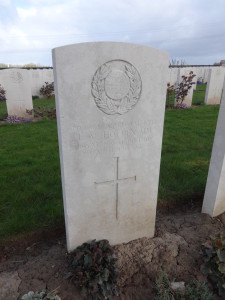 Regiment: Light Trench Mortar Battery, 2nd Battalion, Royal Marine Light Infantry
Regiment: Light Trench Mortar Battery, 2nd Battalion, Royal Marine Light Infantry
Service No: 17738/PO
Date & place of birth: 29 January 1896 at West Lavington, Sussex
Date & place of death: 2 April 1918 (aged 22) near Albert in the Somme, Northern France
Ernest Holden was a member of the Carver family, several of whose young men were killed during the war. Like William Gray, he was awarded the Military Medal, “for acts of gallantry and devotion to duty under fire”, but was killed shortly afterwards.
Family background
Ernest Victor Holden was born in West Lavington on 29 January 1896, the second surviving child of Jack Holden (1866–1939) and his wife Lilian Ada née Carver (1869–1925).
Jack had been born in Heyshott and married Lily in 1888. Over the years, the family lived in various villages in the district, including Graffham and Heyshott; by the time of Ernest’s death, they were living at Royal Oak Cottages in Cocking Causeway. Jack had previously worked as an agricultural labourer, but in 1901 he described himself as a “woodsman”, whereas in 1911 he was working for the District Council.
In 1911, the family were living at Heyshott Green with Ernest described as an “errand boy helping in garden”, aged 15. The census recorded that Jack and Lily had had nine children in all, of whom three had died.
Military service
Ernest enlisted at Gosport on 7 September 1914, joining the Royal Marine Light Infantry. After completed his training, the 2nd Battalion embarked on the HMT “Olympic” at Liverpool on 16 February 1916 and arrived at Mudros on the island of Lemnos in the Aegean Sea a week later. By now, the Gallipoli Campaign had ended in failure and after spending several weeks in barracks, the brigade were shipped to France, arriving at Marseilles in May.
In France, the battalion were attached to the 188th Brigade. Over the next two years, the Brigade was engaged in various battles in northern France, including at Ancre in November 1916, around Arras in April 1917 and at Passchendaele (Passendale) in November 1917.
By early 1918, Ernest was a member of a Light Trench Mortar Battery. In March, the German army launched the first of several offensives codenamed “Operation Michael”. The attack took place over a fifty mile front south of Arras. The British Expeditionary Force was soon in retreat, during which Ernest earned the Military Medal. (The award was recorded in the London Gazette on 16 July 1918, three months after Ernest’s death.)
The British Army suffered a total of 178,000 casualties over a two-week period, while the German losses were estimated at 239,000. As a result of the offensive, the Germans had captured 1,200 square miles of France, and advanced up to 40 miles, but had failed to achieve any of their strategic objectives.
Death and commemoration
Ernest died of his wounds on 2 April 1918 and was buried in the Varennes British Cemetery near Albert. He is commemorated on the Cocking War Memorial.
Other family members
Ernest’s elder sister, Florence (1889–1936) married Horace Rapley who was in the Royal Navy during the war, but died in Germany on 22 November 1918. He is commemorated on the war memorial in the small village of Ebernoe, north of Petworth, near where he was born.
His cousin, Charles Laker (the son of Lily’s sister, Mary Jane) was also killed during the war and is commemorated on the war memorial at Pulborough.